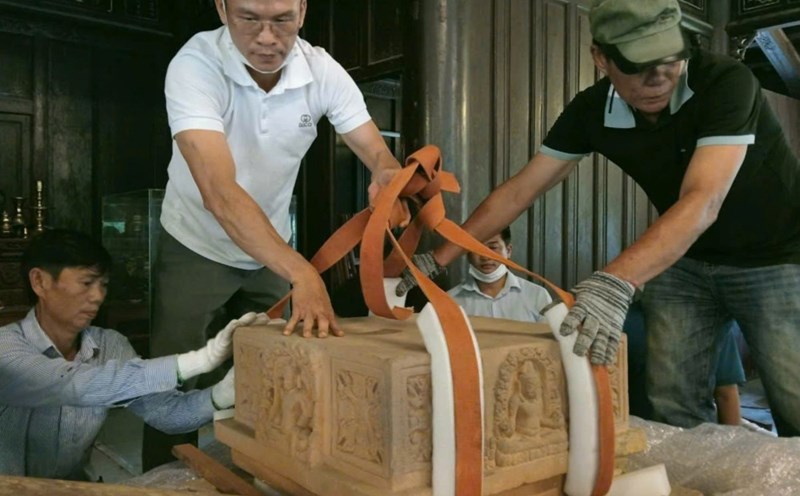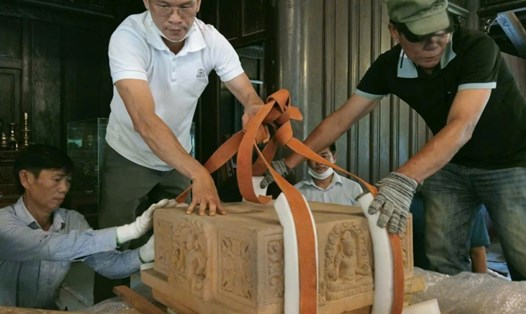Talents from the teacher's training ground
According to the book Dai Viet Su Ky (Complete Annals, Volume 7), his real name was Chu An, from Thanh Dam district. He was upright and straightforward, kept his integrity, and did not seek benefits or wealth. Since childhood, he was famous for being a prodigy, learned to read and write very early, and was proficient in the Four Books, Five Classics, Analects, Mencius, Classics, history, calligraphy, and feng shui.
The Records of the Grand Historian do not record Zhou An's participation in the imperial examinations. Nor does it record whether he passed the imperial examinations or not. The Complete Annals of the Grand Historian states: "He stayed at home and studied, was well-versed in knowledge, and was famous far and wide. He had students all over his house, and often passed the imperial examinations and entered the government (to work as an official), such as Pham Su Manh and Le Ba Quat."
According to the book "Dang khoa luc bo di" at the age of 14, Chu An passed the Thai hoc sinh exam (equivalent to a doctorate) but did not become an official. Historical records also recorded the event that Chu An did not become an official, but opened a school at home. Historical records recorded that teacher Chu An opened a school in Huynh Cung village, on the banks of the To Lich river, called Huynh Cung school. There were many students, at one time up to 3,000 people, many of whom later passed the exam and became high-ranking officials in the court such as Pham Su Manh, Truong Han Sieu, Le Ba Quat, Tran Nguyen Dan, Nguyen Phi Khanh...
From the time of King Tran Minh Tong onwards, most of the talented people were taught and trained at Huynh Cung and Quoc Tu Giam schools, the school of teacher Chu An. Historical records say: “He (Chu An) stayed at home to read books, his knowledge was well-known far and wide, his students filled the door, often passing the highest exams and entering the government. Like Pham Su Manh and Le Ba Quat, who were appointed as Hanh Khien, still maintained the etiquette of students, when visiting the teacher, they bowed and asked under the bed. He was very happy to be able to ask the teacher a few questions before leaving.”
King Tran Minh Tong invited the teacher to become the Vice Rector of the Imperial Academy to teach the Crown Prince.
At that time, the Tran Dynasty was promoting Confucianism and was in great need of truly talented teachers with good qualities and virtues like Chu Van An, a man who was especially interested in training talented people to build the civilization of Dai Viet. Therefore, King Tran Minh Tong invited An to become an official. Dai Viet Su Ky Toan Thu recorded: "Minh Tong invited him to become the Imperial Academy's Rector, to teach the Crown Prince."
According to the regulations during the reign of King Tran Minh Tong (1300 - 1357), Chu Van An held the position of Quoc Tu Giam Tu Nghiep, equivalent to the current university principal position. Tu Nghiep is the official responsible for the activities of Quoc Tu Giam and directly teaches the Crown Prince and other princes. According to documents kept at the Special National Relic of Van Mieu - Quoc Tu Giam, in Vietnam during the Tran Dynasty, the position of Tu Nghiep Quoc Tu Giam was the top academic official of Quoc Tu Giam, responsible for managing education at the Giam school (the only university in the feudal period).
Teaching the Crown Prince and the princes was a great honor, allowing one to interact with the king and prestigious figures in the royal family, but it was also very difficult to handle daily work, and one mistake could mean losing one's head.
In the first selection of the Vice-rector during this period, Mr. Chu Van An was a famous Confucian scholar with profound knowledge and exemplary character, and was chosen to teach at the Imperial Academy for Crown Prince Tran Vuong. Up to now, no documents have been found to record exactly which year Mr. An was invited by the king to hold the position of Vice-rector of the Imperial Academy. He was appointed as the top official in charge of managing teaching at the Imperial Academy and was the first Vice-rector to be officially recorded in the Complete Annals of Dai Viet. It can be determined that Mr. Chu Van An was invited to be the Vice-rector around the year when young Tran Vuong was chosen as the Crown Prince to succeed King Tran Minh Tong; and until he submitted the "seven-cut petition" unsuccessfully, he resigned under the reign of Tran Du Tong.
Resigned after submitting the "seven-execution memorial" unsuccessfully
Teacher Chu Van An was an exemplary, straightforward and strict person. According to the historical records, anyone who was bad was scolded by him, even shouted at and not allowed to see him. According to the book Summary of Vietnamese Historical Chronology: “In 1358, the era name was changed to Dai Tri. The retired emperor Minh Tong died, loyal ministers such as Truong Han Sieu and Nguyen Trung Ngan also died, the treacherous ministers formed cliques, Du Tong drank and played too much, causing the court to collapse, bandits rose up like bees, and the people suffered in every way. Chu Van An submitted a “petition to behead seven treacherous ministers”, but the king did not listen, so he immediately resigned from office and returned to teaching” (Ibid. p.70).
The above event was recorded quite clearly in the Complete History: "Du Tong was fond of playing and lazy in politics, many powerful ministers violated the law of the country. Chu An advised Du Tong but he did not listen, so he submitted a memorial requesting the execution of seven flatterers, all of whom were nobles and loved by the king. People at that time called it "the memorial of seven executions". The memorial was submitted but did not receive a response, so he (Chu An) hung up his hat and returned home" (Complete History. Vol. 7).
Disappointed with King Du Tong, teacher An hung his hat at the South Gate, then resigned from his position and returned to his hometown to live in seclusion. Historical records also record that Chu Van An loved Chi Linh Mountain (now in Hai Duong), so he came to live there, opened a school to teach, and wrote books. Whenever the court had a big meeting, he returned to the capital. King Du Tong entrusted the government and state affairs to teacher An, but the teacher firmly refused the wealth and honor, and refused to become a mandarin. Queen Mother Hien Tu told the king: "He is someone who cannot be made a servant. How can I order him around?"
King Tran Du Tong ordered the eunuch to bring clothes to give to Master An. After the teacher thanked him, as soon as the messenger left the house, he gave them to someone else to wear. People at that time considered him a noble person, not interested in wealth or luxury. When King Du Tong died (in 1369), Duong Nhat Le became king, the Tran dynasty almost lost the country. In 1370, the Tran royal family raised an army to suppress the Duong family, hearing that the court had established a new king (Nghe Tong), Master Chu Van An was very happy. Despite his old age, he still used a cane to return to the capital to pay respect to the king, then asked to return to his hometown, not accepting any titles.
According to the Historical Records, on November 26, Canh Tuat year (1370), Trieu Khanh 1, Chu An, the Vice-Chancellor of the Imperial Academy, passed away. He was posthumously awarded the title of Van Trinh Cong and worshiped at the Temple of Literature - Imperial Academy. Later, during the early Le Dynasty, historian Ngo Si Lien in the book Dai Viet Su Ky highly appreciated him: “There were many Confucian scholars in our country who were used in life, but some only thought about fame and fortune, some were concerned about wealth and honor, some were flatterers, some only wanted to eat and keep their bodies. No one cared about morality, thought about helping the king to promote good virtues for the people to receive grace like To Hien Thanh of the Ly Dynasty, Chu Van Trinh of the Tran Dynasty. But Hien Thanh met a wise king, so his fame and career were seen at that time. Van Trinh did not meet a wise king, so his learning was seen by later generations.”
Teacher Chu Van An, during his lifetime, dared to frankly dissuade the wrongdoings, guiding the king to follow the bright path for the country and the people. The Imperial Academy where he was the Vice-Chancellor and the Huyen Cung school were the training grounds for talented people. All the mandarins of the court were trained by teacher Chu Van An, demonstrating their talents, keeping the country and the people safe.
Historian Ngo Si Lien wrote: “A thousand years later, hearing about his demeanor, wouldn’t it make the deceitful become upright and the weak become independent? If we don’t find out the reason, who would know that his posthumous name is worthy of the man he was. He truly deserves to be considered the ancestor of Vietnamese Confucian scholars and worshiped in the Temple of Literature.”
He died on November 26, Canh Tuat year (1370), during the Tran Nghe Tong dynasty, which has been 654 years. Van Trinh Cong, the founder of Vietnamese Confucian scholars, is worshiped at the Temple of Literature - Quoc Tu Giam in Hanoi city.











